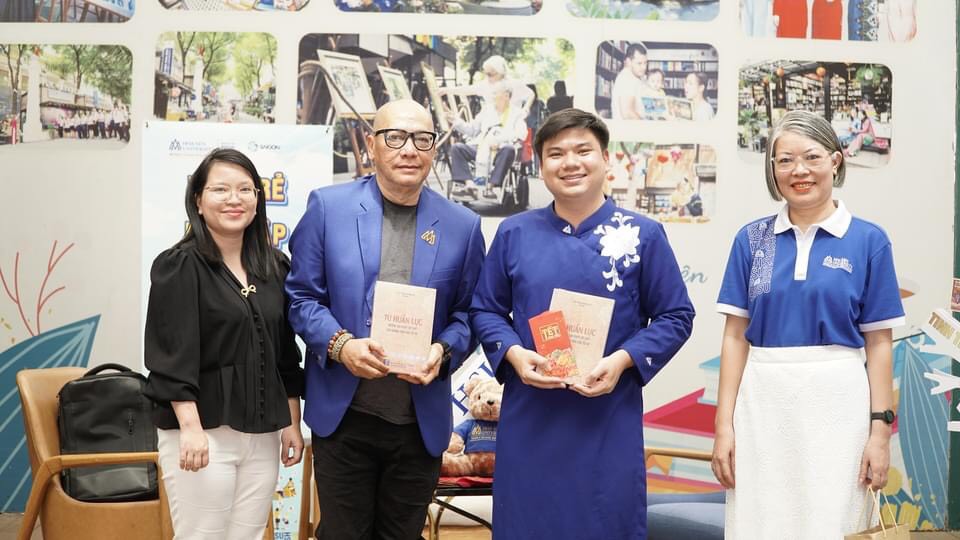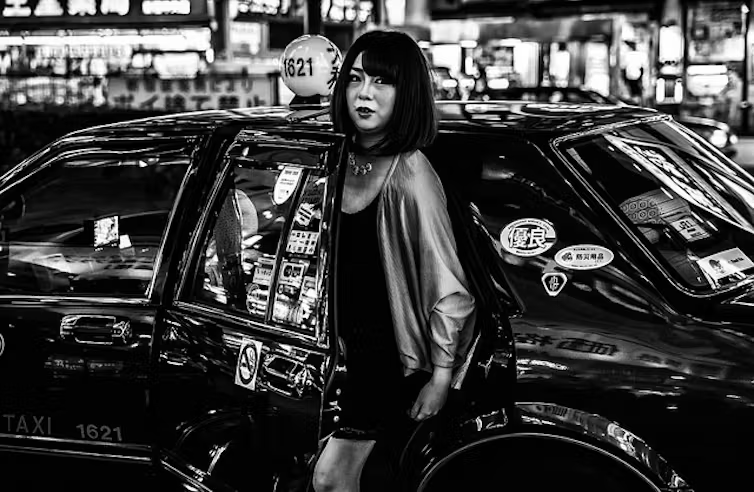[RECAP] Talk show: YOUTH and INTEGRATION
Author: Doan Thi Ngoc – Lecturer, Hoa Sen University
On February 12, 2024 (the 3rd day of Tet) at Nguyen Van Binh book street in the downtown area, Hoa Sen University and Saigon Book co-hosted the Talk show: “YOUTH and INTEGRATION“. The Talk show’s speakers were Mr. Duong Ngoc Dung (Ph.D)- Director of the Philosophy Program, Ms. Doan Thi Ngoc (MSW & MEd in TESOL)– Lecturer and Founder of Gender Talk HSU and the host-Mr. Nguyen Hong An (MA) – Lecturer at Hoa Sen University. This Tet event attracted a large number of audience and visitors.
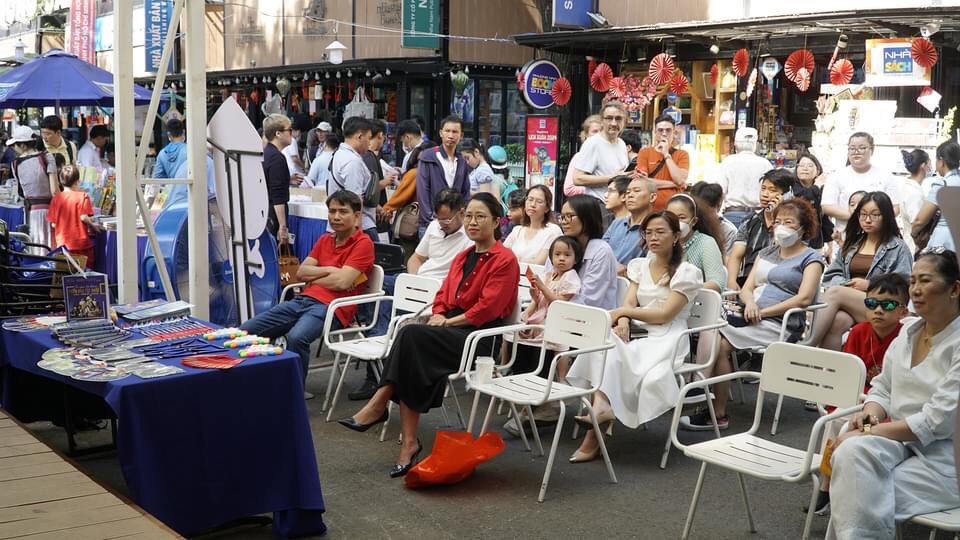
The key contents included:
1. Perspectives on youth and the strengths and challenges of youth,
2. Why do youth need global integration, and
3. HSU Go Global Program for 2024 Students.
First, the speakers discussed perspectives on youth and the strengths and challenges of youth.
Mr. Dung: Youth is a concept determined by the intellectual aspect (Mind), instead of being based on a biological perspective. Looking from this perspective will help us open up to new things, be more willing to accept challenges, and courageously pursuing the truth. For example, in reality, there are people who are very young but think of themselves as old and vice versa, there are people who are old but they are young at heart.
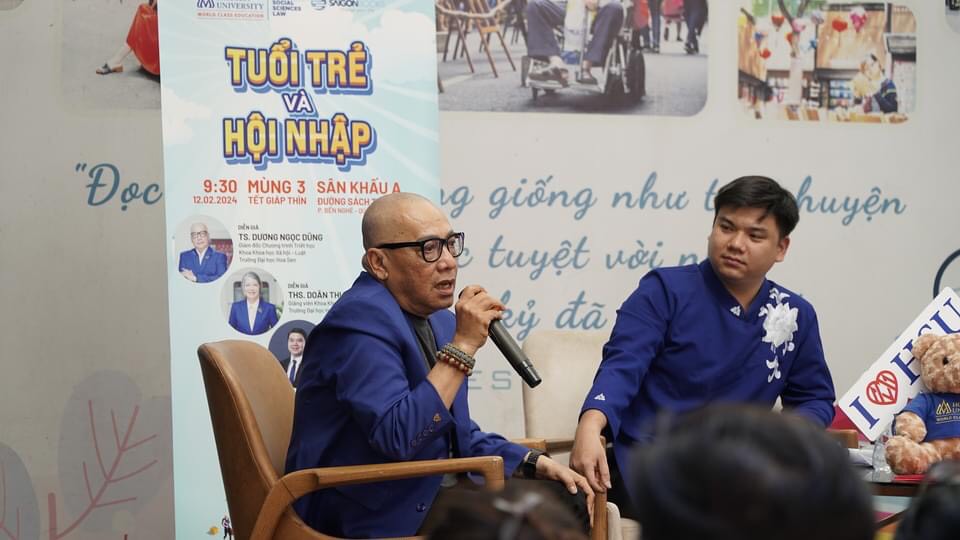
Ms. Ngoc: Vietnam is in a period of “golden population structure” and the country can be strong and thriving if it can develop the potentials of youth. Youth are considered a great social force, an important human resource and one of the core factors determining the future and destiny of the country. We can approach youth from the perspective of socio/bio/psychological and spiritual development. The youth stage is usually defined for people around the age of 20-40. Young people in this period often have a lot of time, but sometimes they do not know what to do and how to use their time effectively. Many youths also have a lot of anxiety and confusion, as they often do not know what they want, who they are, or what their identities are.
In my opinion, youth in the modern time are excellent. They can do anything they want to because they are young, healthy, beautiful. They have desires, ambitions, big dreams and want to make a difference. Youth in this stage continue to develop their identities, explore personal and group relationships, and often turn outward. This is also the age of love, education, career, and marriage. Young people in this stage often have wide social relationships such as romantic partner, loved ones, friends, colleagues, and business partners. They are strong, self-reliant, decisive, independent, responsible for their life and are often willing to accept risks. Youth’s personal commitment are quite high. Sexual needs are part of loving relationships and intimacy.
If young people are successful in this stage, it can lead to positive, healthy relationships and comfort, a sense of security and commitment. On the contrary, if they fail or have not found their identity, they may avoid intimacy, fear commitment, which can lead to loneliness, boredom, laziness, disappointment, addiction, and sometimes depression. Youth often lack knowledge, skills, and experience, so they may make irrational and impulsive decisions. They may feel confused and alien in college or professional environments.
Physically, during this stage, body changes occur slowly and are less obvious than in previous stages. Health is at its peak. By the age of 25, human physical development has reached perfection. The brain weight reaches its maximum, the number of neurons reaches its highest level (14 – 16 billion). The skeletal system and muscles develop stably and evenly, creating perfect beauty in adults. At the same time, speed, endurance, flexibility, and strength all thrive thanks to the stable development of endocrine glands as well as the growth of sex hormones.
Psychologically, the special feature of this stage is complex changes in social factors, requiring people to have psychological adaptation to those changes.
Second, the speakers discussed youth integration.
Ms. Ngoc shared that Hoa Sen University (HSU) has developed an integration program. This is a special experience program that HSU offers to prospective students in 2024 with the goal to create conditions for students to have early access to advanced education, ready to integrate into a training environment that meets international standards.
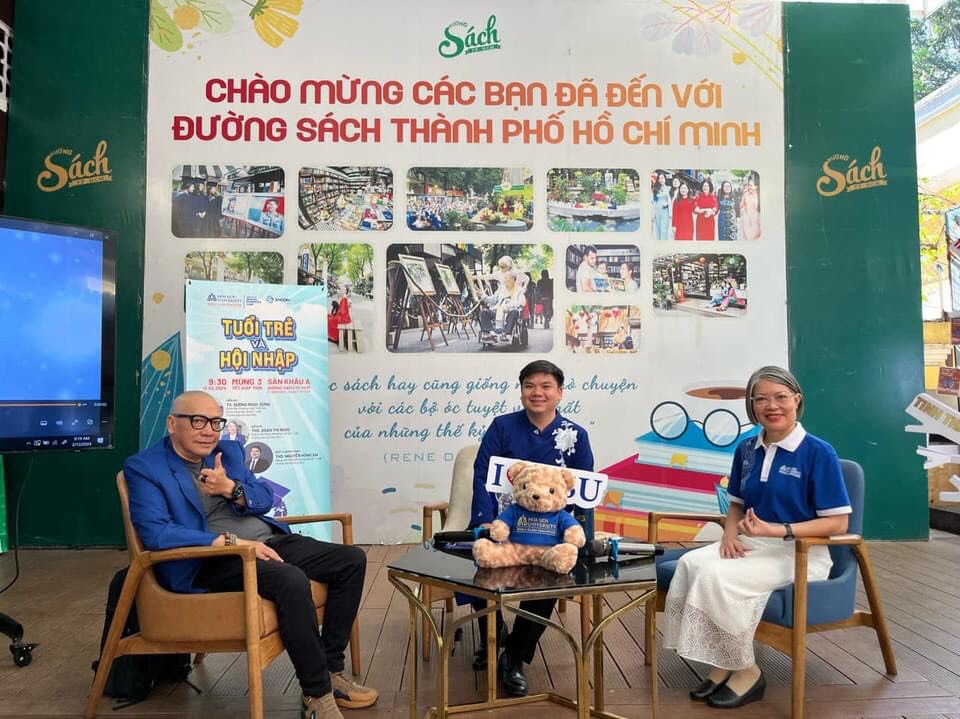
Mr. Dung: When talking about integration, it is often mentioned from three perspectives: economic integration, political integration, and cultural integration. In this context, we want to talk about intellectual integration. Only on the basis of intellectual integration and the effort to absorb all the available resources on the planet, will we be able to protect our cultural identity and participate in global integration without losing national identity. The best means to integrate planetary knowledge is to master English proficiency and AI technology.
Ms. Ngoc shared her experience that integration can start right in your own country to know where you are with the world and create confidence when interacting with foreigners. Youth need to seek education and responsibility for their own life, family, community and society. They should consider their perspective on learning. That means learning not only to find a job, but more importantly learning is to understand oneself, to develop oneself, to know how to manage and use time effectively, to liberate oneself, to be free and happy and to know how to serve their community. Learning and doing go hand-in-hand, so they can turn their potentials into talents. If so, young people need to slowly discover what their life goals are. To find a life goal may be difficult and will vary between individuals and requires a process. They can search their purpose in life through continuous learning, doing, trying, self-study, self-reading, self-improvement, self-discovery, self-responsibility, self-discipline, self-regulation, and curiosity.
There are many ways to discover oneself like the circular method above and youth can take a personality test, or a career test, learn about multiple intelligence theory, or the hedgehog theory or the Ikigai model. By discovering themselves through the Ikigai circles, young people may find their ideal job. Ikigai helps you discover what one is good at? What does one like? What does society need? Will what you do get paid? Ikigai’s intersection between the circles such as what you are good at and what you like is passion. The intersection between what you like and what society needs is the mission. The intersection between what society needs and what is paid is career. The intersection between being good and being paid is expertise. Passion combined with mission, career, and expertise, youth may find the ideal job.
Question: If we are open to new experiences, especially international experiences, will it bring benefits to ourselves?
Mr.Dung: The process of intellectual integration will take place as a dialectical adventure: that is, being ready to enter society (reengagement), escape and negate that world (dis-engagement), rediscovering one’s national cultural identity, and finally reintegrating, but not dissolving, with all the mature internal capacities into the world intellectual community (re-engagement).
Ms. Ngoc: To integrate strongly with the world, young people need to have various competencies like critical thinking, creative thinking, breakthrough thinking, English skills, intercultural competency, effective communication skill, and empathy, and master of their discipline, which is in sync with the world’s standards. Young people should read a lot and focus on self-study. Lifelong learning is one of the steps to help them integrate into the world. Reading books such as original books in English, classic books, self-help or personal development books, spiritual books, specialized and interdisciplinary books is one of the best options to improve one’s self. As my experiences working with young people, I believe today’s youth are very talented. They need to be encouraged, supported, and inspired to change society from small things, from issues they care about.
The more we integrate and exchange internationally, the more we find ourselves needing to follow common standards, respect differences and diversity, show tolerance, empathy, equality, justice, promote gender equality, and eliminate prejudice, bias, and discrimination. Learning and working are based on high criteria and standards to serve diverse needs of people domestically and globally with safe, high-quality services, and constantly aim for excellence.
Finally, Ms. Ngoc informed audience more about the program. This is the first time HSU has implemented this special program to meet international standards. It is expected that the school will award 2,000 scholarships for 2024 new students.
